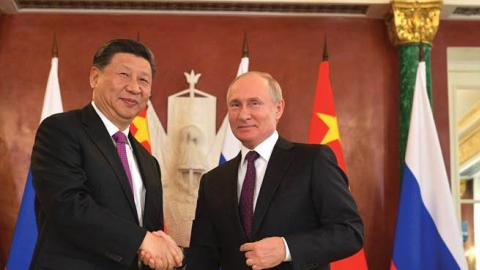Not quite three weeks before Russia invaded Ukraine, China’s President Xi Jinping declared a “no limits” friendship with Vladimir Putin. For a China promising to use its growing power to advance what it calls a Community with a Shared Future for Mankind, Xi extending the hand of authoritarian solidarity and friendship to the Russian president will come back to bite, personally and for his country’s global leadership ambitions.
Indeed, Beijing’s evasive and indecisive words and actions since Putin began the invasion indicate that it’s unable and unwilling to assume the role of responsible global leader despite its promises to other nations.
Like his Russian best friend, Xi sits on the proverbial throne in an ivory tower. He is the most powerful Chinese leader since Mao Zedong and rules as if an emperor from dynastic eras. Xi has successfully repealed term limits in the Communist Party’s constitution, which could allow him to rule for the rest of his life, and entrenched Xi Jinping Thought in the document as one of the country’s guiding ideologies. This is the domestic political background to a Xi-led China staking its claim to global leadership.
Russia’s invasion of Ukraine is the most brazen and grievous challenge to the existing international order for many decades. The outcome of Putin’s gamble is not yet known. But the past three weeks have already exposed Beijing as insincere, unwilling and unable to behave as a leader.
China’s inconsistent and indecisive reaction to the invasion makes this obvious. It refuses to condemn Russia or even countenance open discussion about the issue, including in the United Nations Security Council, but affirms the importance of respecting and safeguarding the sovereignty of all countries including Ukraine’s. Xi has remained conspicuously silent despite his “no limits” friendship with Putin. China refuses to levy sanctions against Russia and has even helped soften the blow by lifting previous restrictions on imports of Russian wheat.
In short, Xi has diminished himself and his country.
If Xi makes good on the “no limits” friendship, then China joins Russia as an international pariah while the growing economic measures against Russia will likely affect major Chinese companies doing business with Russian entities. If Xi abandons Putin, then China loses credibility and standing with its major authoritarian ally but will not win back lost trust and amity with liberal democratic nations.
Even if China earns short-lived kudos for negotiating a ceasefire in Ukraine, Xi’s hubris and overreach mean his plan for regional and global dominance will have been set back. To achieve its ambitions, Beijing depends on creating an exclusive sphere of influence in East Asia within which it can shape the domestic and external policies of other nations. For that to occur China needs to ease America out of Asia by reducing the effectiveness of its alliances and partnerships, without which Washington cannot sustain its presence in the region. Beijing also needs other Asian countries to become subservient or neutral rather than seek to balance and counter Chinese power.
In other words, China cannot achieve its aims unless it is able to blunt American leadership and lull nations into a false sense of security until it is too late to reverse course.
This is where Putin’s brutality against Ukraine becomes a problem for China. Putin is reminding the world that an authoritarian sphere of influence is different from a system overseen by liberal democracies. A Chinese sphere of influence in Asia could be as unpalatable for other nations as a Russian one over Central and Eastern Europe. Just as Russia reserves the right to use force to resolve disagreements with neighboring countries, China does the same against states such as Taiwan, Japan and five nations in the South China Sea against whom it has maritime disputes.
Nothing prepares and focuses the strategic mind more than the illegitimate use of force and watching the loss of innocent lives in real-time. Putin is prompting China’s neighbors to recall that revisionist authoritarian states pose the greatest threat to world order, and we are no longer living in the same benign post-Cold War world of the 1990s. For those countries in China’s sights, America has become even more indispensable — and the only way to deter China from starting a fight is to properly prepare for one in the first place.
China seeks a so-called Community with a Shared Future for Mankind under its leadership. Beijing’s insincerity, indecisiveness and irresponsibility over the past three weeks have rendered that an even more unattractive prospect for the rest of the world.
Read in the New York Post

















